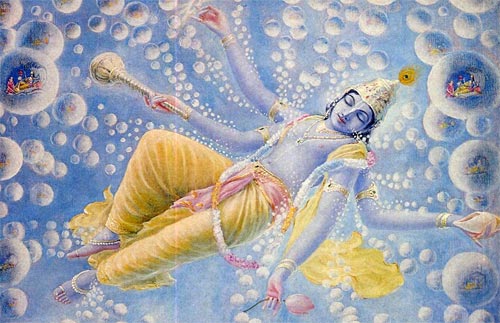
Lord Vishnu, an expansion of Lord Krsna.
Breathes out material universes and living beings thus forming the material world.
The songs and lyrics contained here are expressions of consciousness of God, the universe and man’s real goal of life. The upliftment of peace and prosperity, success, self realization, fulfillment, and all spiritual recognition that life in its real sense has to offer. Here is a link of the fourth song.

"Jivatma Love” Composed by Steve Taylor (Siddhajana Dasa) A song about the faulty choices of the eternal living beings. Spirit souls are particles of Supreme, Complete Whole Super Soul creates this world. We souls made faulty desires to control, Loving Divine sent us to this world. We enter this material place with pride and forgetfulness, Of who we are, tiny soul cells of His eternal greatness. We think we are free in this house of dread, Not knowing everything here must become dead. Here unsatisfied love turns to lust, then to anger, Lust manifests itself and becomes danger. We steal the wealth and misuse material energy, Mistaking it for original synergy. Originally ordained to be eternal servants of Creator, Instead we become slaves of devilish dictator, We lost our true nature and call ourselves pigment colors, Fighting each other in battles for gold and dollars. Ignorance reigns in this age of confusion, Material science simply creates more illusion. Without spiritual science in actions, We don't get it and create more protractions. There's a solution to this miscalculation and mess, We have to turn our attention within the Divine Address. Eternal servants of Supreme Being. Then we return to consciousness as eternal living beings. We can no longer act like animals following our mad minds, We must be conscious and gentle to all living kinds, We shall now turn again to our real Controller, Surrender with love, serve Him with devotional sounder. Chorus Jivatma (spirit soul) love is all we are! Jivatma love we will always be! Paramatma (Supreme Soul) Love is all there is. Paramatma controls and distributes the eternal happiness. Hare Krsna, Hare Krsna, Krsna Krsna, Hare Hare. Hare Rama, Hare Rama, Rama Rama. Hare Hare.
The Supreme Lord said, The indestructible, transcendental living entity is called Brahman, and his eternal nature is called the self. Action pertaining to the development of these material bodies is called karma, or fruitive activities. BG. Chapter 8 Text 3
PURPORT by Srila A.C. Bhaktivedanta Swami Prabhupada
Brahman is indestructible and eternally existing, and its constitution is not changed at any time. But beyond Brahman there is Parabrahman. Brahman refers to the living entity, and Parabrahman refers to the Supreme Personality of Godhead. The constitutional position of the living entity is different from the position he takes in the material world. In material consciousness, his nature is to try to be the lord of matter, but in spiritual (Krsna) consciousness, his position is to serve the Supreme. When the living entity is in material consciousness, he has to take on various bodies in the material world. That is called karma, or varied creation by the force of material consciousness.
In Vedic literature the living entity is called jivatma and Brahman, but he is never called Parabrahman. The living entity (jivatma) takes different positions—sometimes he merges into the dark material nature and identifies himself with matter, and sometimes he identifies himself with the superior spiritual nature. Therefore he is called the Supreme Lord’s marginal energy. According to his identification with material or spiritual nature, he receives a material or spiritual body.
In material nature he may take a body from any of the 8,400,000 species of life, but in spiritual nature he has only one body. In material nature he is sometimes manifested as a man, demigod, an animal, a beast, bird, etc., according to his karma. To attain material heavenly planets and enjoy their facilities, he sometimes performs sacrifices (yajna), but when his merit is exhausted, he returns to earth again in the form of a man.In the process of sacrifice, the living entity makes specific sacrifices to attain specific heavenly planets and consequently reaches them. When the merit of sacrifice is exhausted, then the living entity descends to earth in the form of rain, then takes on the form of grains, and the grains are eaten by man and transformed into semen, which impregnates a woman, and thus the living entity once again attains the human form to perform sacrifice and so repeat the same cycle. In this way, the living entity perpetually comes and goes on the material path. The Krsna conscious person, however, avoids such sacrifices. He takes directly to Krsna consciousness and thereby prepares himself to return to Godhead.
Impersonalist commentators on the Gita unreasonably assume that Brahman takes the form of jiva in the material world, and to substantiate this they refer to Chapter Fifteen, verse 7, of the Gita. But this verse also speaks of the living entity as “an eternal fragment of Myself.” The fragment of God, the living entity, may fall down into the material world, but the Supreme Lord (Acyuta) never falls down. Therefore this assumption that the Supreme Brahman assumes the form of jiva is not acceptable. It is important to remember that in Vedic literature Brahman (the living entity) is distinguished from Parabrahman (the Supreme Lord).